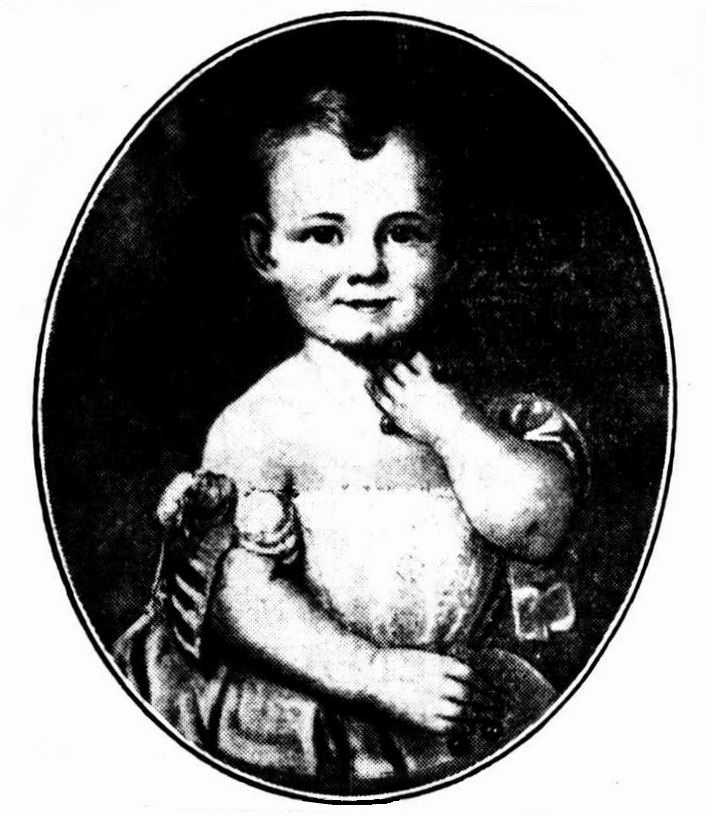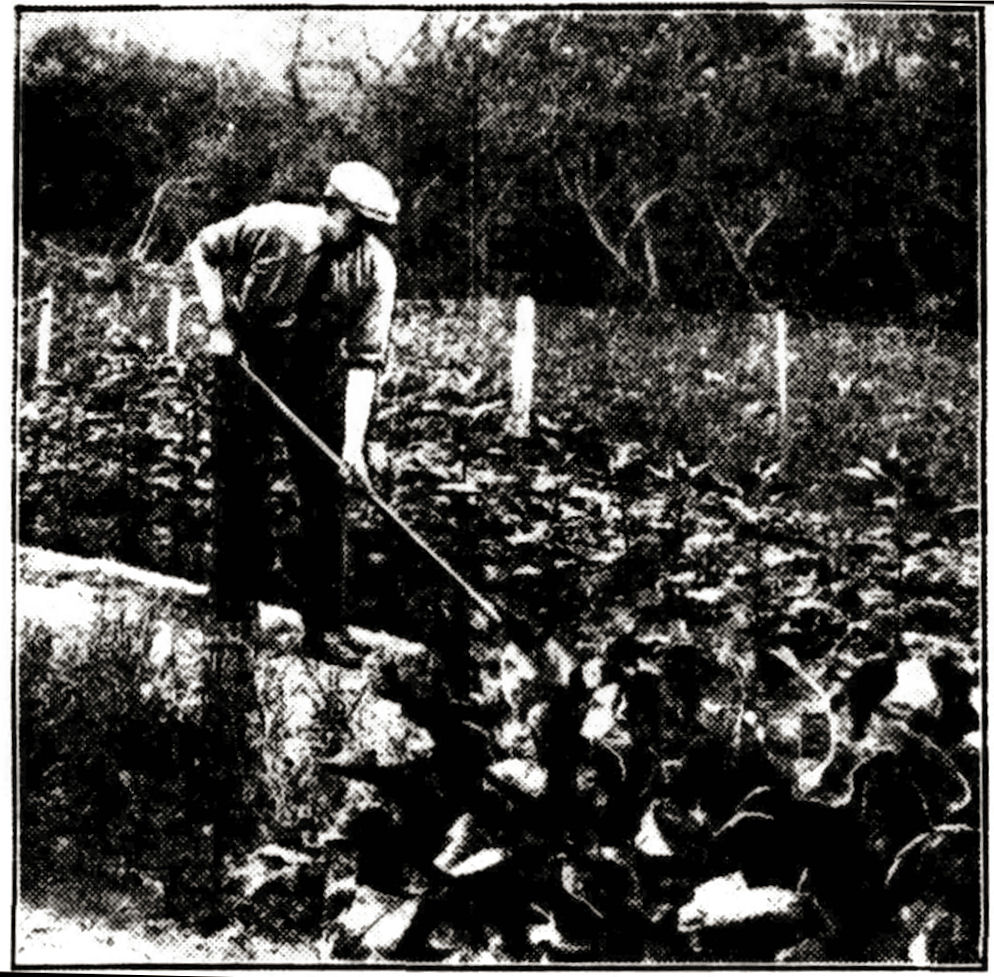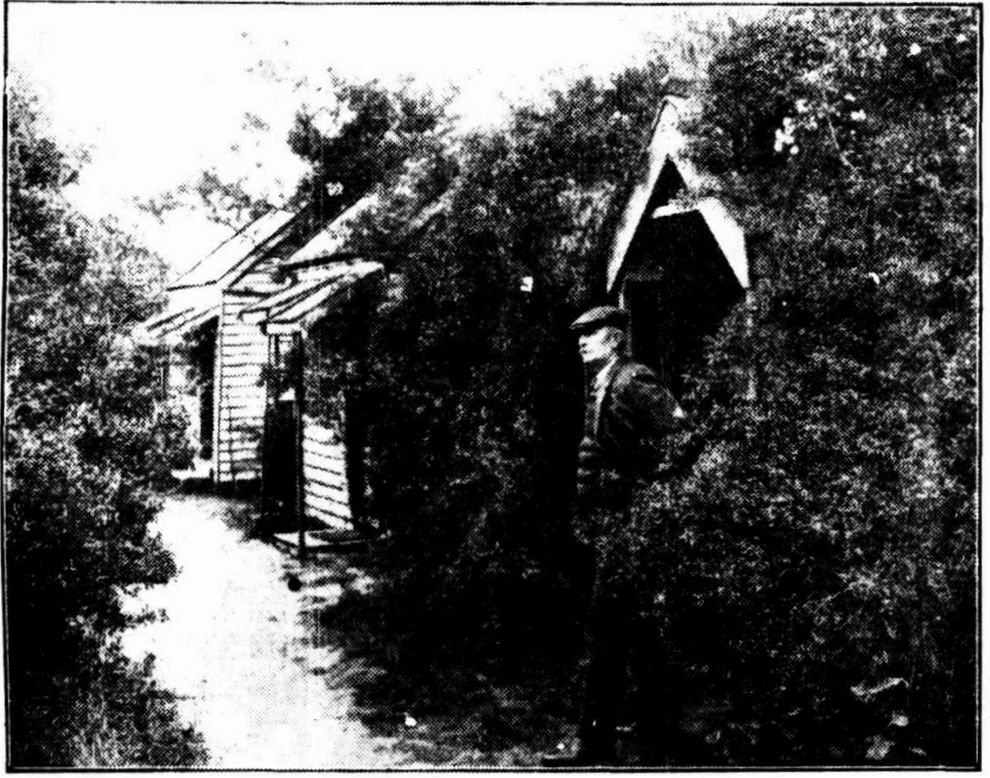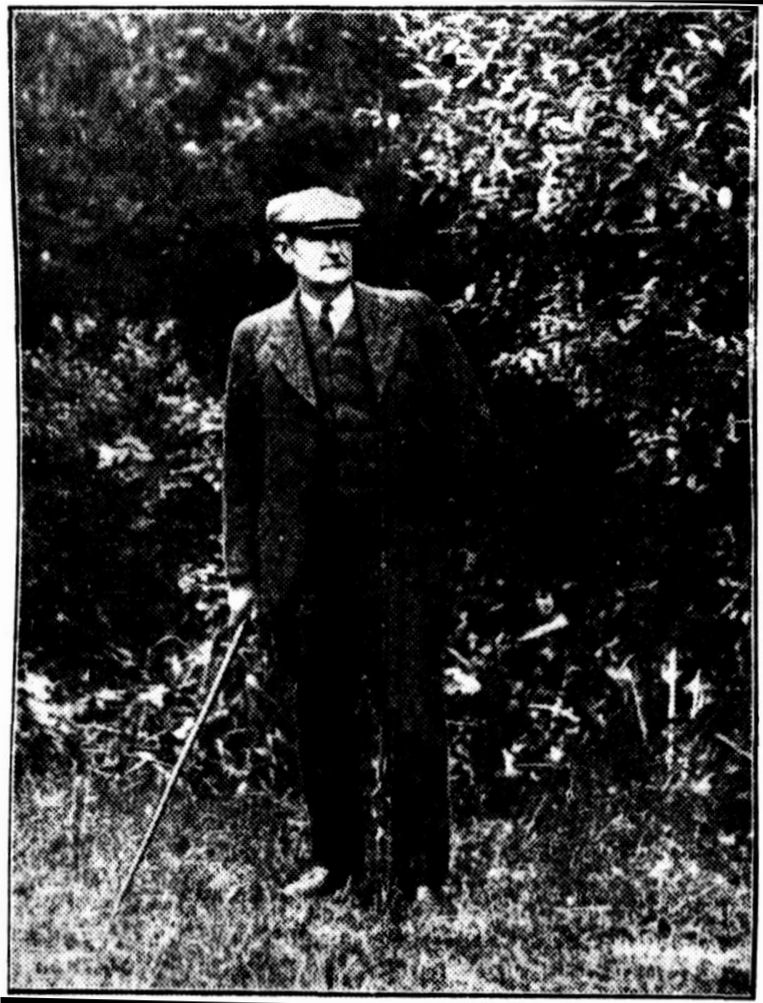HIS HOURS OF EASEMR. DONALD MACDONALD'S HOBBIES.LIFE IN THE OPEN AIR."The Argus" Sat 8 December 1923, page 10 By R.L.C. Every boy and every dog in the neighbourhood of Black Rock, runs the legend, knows Donald Macdonald. Few men ever cease to be boys in spirit, and Mr. Macdonald has come nearer to the secret of eternal youth of heart and mind than most of his kind. He revels in the company of youngsters, sharing their pleasures with zest, and himself recapturing a generous measure of the "fine, free, careless rapture" of boyhood. What a delightful companion for boys is "Mr. Mac," as they call him—he who holds the keys to so many a realm of wonder and delight. As for his love for dogs, it is but part of his affection for every living thing. In the most forlorn and friendless of mongrels he ever can find some gleam of virtue that merits tender care and compassion. Not for him the companionship of the pampered aristocrats of dogland; rather the succour of the distressed and battered wayfarer. There is always room for a lonely stranger in the spacious circle of his dumb friends. 
THE INFANT DONALD MACDONALD. Teatree and wattle flourish in Mr. Macdonald's pleasant garden at Black Rock, and among the branches flit the birds he understands so well. Nothing that happens in that restless little world escapes his notice. He will take you to a nest whence the last member of a brood is making its first precarious survey of the world. "The last but one went yesterday," he says. "This one will be off in a day or two." There comes the note of a wistful longing for his beloved haunts outback. "I realise quite clearly now," he confesses, "that I was born for bush or country life. My friends may say, indeed, that everything I've done in journalism proves that. The opening is rather obvious: ask, and it shall be handed unto you." Despite more than 40 years of metropolitan journalism—for it was in 1881 that he left the Corowa (N.S.W.) "Free Press" to join "The Argus"—he has no liking for the city—"neither time nor use for it," he declares, with an emphasis that almost imports an accent of scorn. "I came here to Black Rock," he explains ruefully, "to get away from the city; and the irony of it was that the city immediately got up and followed me. Look at it now! The place that was a blackfellow's kitchen midden and a legend only a few years ago is the ward of a city. I'm afraid to move out any farther, because, even as it is, the city seems much too large. No, the things that move me are distinctly not architectural. The finest sight I've seen for years was only a few weeks ago, up in the Mallee, near Lake Meran, when an Itala car purred its quiet way along the headland of a thousand acres of wheat, a paddock that had made its own horizon, and, with ears turning from green to gold, was as level as a lawn. I wasn't thinking of prices or profits. It was the thing itself that appealed—something as beautiful as it was bountiful. That feeling has been with me always. There's a painting of me, done when I couldn't have been much more than a year old. Both hands are full of cherries. I've got 'em for keeps, too. No prejudice about stone fruit there!" IN THE VEGETABLE GARDEN.
AT WORK AMONG THE VEGETABLES. In a large measure other men's hobbies are Mr. Macdonald's tasks—cricket, foot-ball, nature study, camping, the outdoor life generally. But the border line between work and recreation is largely invisible, and Mr. Macdonald confesses that none of these things ever presents itself for his attention in the guise of hard labour. Off duty, however, his two favourite hobbies are gardening and fishing, "and," he adds warningly, "I prefer to do them both in my own way, which experts in each would be sure to say is the wrong way. Perhaps it is, but it's not worth while changing now. As a boy I formed a friendship with au old English gardener. He did two things that were the acts of a real friend. He gave me his gun, and he started me growing vegetables. I went on growing vegetables, not because I liked them better than flowers or trees, but just because I had begun that way. Leaving natural bias out of the question, some of us drift into our hobbies, and some fall into them—are, maybe, crippled for life. How many have scoffed at golf, and declared that it wasn't a game, but a dialect! Then one day they have taken a trial shot, and it has come off. Well, that's a case of falling into a hobby. My vegetable growing was a pure case of drifting, yet it has given me, and still gives me, all that a hobby should—change of occupation, recreation, interest, exercise. It satisfies what is my most pronounced natural bent, a real delight in seeing things grow and in helping them to grow." "A rather curious fact, in view of all the hybridising that goes on in the plant world for the betterment of varieties, is that some of the things recommended to me by that old gardener 50 years ago — and he may have had them recommended to him 50 years earlier—are still the best I can get—Yorkshire Hero peas, early shorthorn carrots, brown Spanish onions, Canadian Wonder beans, hollow crown parsnips, cabbage lettuces, and so on. The great improvement in recent years has been with early peas, potatoes, and French beans, the stringless kinds; and the great disappointment with tomatoes, which every amateur gardener once laid himself out to cultivate to perfection. I have a little plot of odourless onions in just now. The advice that one should put one's earthly house in order applies specially and pointedly to a garden. The first word of advice I would give a beginner is to get his soil in order by introducing humus or rotted plant fibre, in abundance and at every opportunity. Our soil, like any soil in a dry country of evergreen trees, with no natural enrichment in the fall of the leaf, needs humus to humour its flintiness and to make it mouldy and marrowy. The soil of England is fat; ours is naturally lean and bony; but water and sunshine are great magicians. My vegetable garden has no beds in it. It's a garden of rooms running its whole length, and it's on a slope, and thus may be irrigated perfectly and with little effort. It's not the right way to use soil to advantage, but it's the right way for me, as a hobby. Perhaps, after all, we are getting pernickety in our gardening." UNORTHODOXY IN FISHING.As to fishing, Mr. Macdonald will declare to you that, here again, his theory is all wrong. Why, you ask. "Because," he replies, "I'm not very much concerned about the kind of fish I get. I've no particular ambition to catch the big ones,,and I decline, in any event, to make a labour of the sport. I'd sooner have a good day with mountain trout in the heads of one of the Lorne streams than any fish that swims in stream or sea. The one perfect day I remember was spent 40 years ago under the Cumberland cliffs, among rocks and riffles, fishing for grayling, with dozen and a half for the bag. I can still get the cucumber tang of those beautiful little fish. Even now a half-dozen English trout from the ferny pools of the Erskine or St George make something like a perfect day; but for sentiment's sake, the appeal of the little fish, the spotted red-finned mountain trout that lurk by rock and log and ripple, is irresistible and will last while life remains. It began at the pin-hook stage on Keilor Creek, and was continued in later years at Lorne, with two boys, Billy and Cleave Herbert, on the heads of the Little Erskine, the Sheoak, and Cora Lynn. With fine tackle, it's all delightfully dainty." "For this reason — less, perhaps, the sport itself than the magic of its recollections—I like to go down to some of those quiet pools on the St George and fish for eels in the moonlight—for eels, mind you, the despised and rejected of every angler who takes a decent pride in himself and his sport! But I've had some wonderful hours there, when the white gums looked ghostly through the deep night shadows and the night began to speak, as it always will down there, if you listen and wait for it. Last year, with two boys for companions, I had some great days with the little fish at Lorne, and we're already talking about more of them. Crayfish snaring was another delightful recreation of those older days on the Lorne coast, but, to be quite honest, it's a bit too hard and somewhat too damp for these later days; and mutton has such a habit, when temptation comes, of still imngining that it's lamb. I like to sit above the tide, though, and watch Jack Anderson, with snare and bait stick, doing it in the old, incomparable way. To get the best out of it, one must find more than fish in the fishing, without going quite to the extreme of the competition flycaster's view that the fish and the water greatly interfere with the sport. Our own ways are always the best ways — for us. There's nothing so comforting in life its illusions." SOME ESSAYS IN BUILDING.
SOME COTTAGE BEDROOMS AND THEIR BUILDER. At housebuilding Mr. Macdonald has tried his 'prentice hand in spare moments. "If I have any particular bent in that direction," he says, "it is, perhaps, for adaptation. If I cannot get the exact material or the plan that I want, I can generally improvise something that will do just as well. A scientific friend of mine, who built a Tudor cottage for himself up on the moors, used to say that my building expedients reminded him of the favourite Australian scientific formula, 'As near as dammit.' The truth is that the amateur who begins to build a house needs to be a little nearer the mark than that. He must use his spirit level and his plumb line frequently, and he must never forget the old Scottish window maker's plan of getting his rectangles exact. All the bother with the framework is more than worth while when you come to the flooring, the lining, and the weatherboards. That is the time when the slapdash chickens come home to roost." "I built four cottage bedrooms, helped, or rather directed, by a girl of 16. She had helped her father to build their first house at Black Rock, and knew more about it than I did, and I knew enough to obey orders. In later years, when the war came, I was able conscientiously to recommend that girl to the military authorities as capable of building a hospital first and nursing in it afterwards, and that is exactly what she did in emergencies in Egypt and Palestine, where she won her Royal Red Cross. There's a bit of family sentiment in the climbing roses which cover the cottages to-day. Away back in the early days my grandfather was the first white man who looked down from the Divide upon the meadows of Ercildoune and took possession of it as a run for the Learmonths. The first rose brought from England by the Learmonths and planted at Ercildoune was a climber, and my roses are cuttings from it." Mr. Macdonald's father, by the way, was of that company of Scottish Canadians from Ontario who pioneered the famous coaching services of Cobb and Co. in the days before railways had reached the distant corners of the State. FOOTBALL AT ESSENDON.Going back to earlier days, Mr. Macdonald recalls that cricket and football were two of his hobbies before they became part of his occupation. As a youngster he played chiefly at Keilor, where part of his boyhood was spent, but had an occasional game of football with Essendon about the time when that team stepped up to senior rank. It was a privilege to wear Essondon's colours in those far off days. "They were a very gallant company," says Mr. Macdonald, "the kind of fellows one holds long in regard and remembrance. There were men like General 'Fred' Hughes, a very solid ruck man; his brother, Dr. Kent Hughes, very light but absolutely tireless; H. W. Bryant, K.C., a dashing half-back, who finished up with a broken thigh; 'Tom' Chadwick, another stalwart about the back lines and later a well-known coursing judge; George Miller, neat and hard to beat; James Robertson, the beau ideal of an athlete; W. Raper, still president of the 'same old' club; James Watt, another of the brilliant light division, and the McCrackens, in whose paddock Essendon's first games were played." 
MR. DONALD MACDONALD IN HIS GARDEN. Mr. Macdonald has an amusing recollection of the first big cricket match which he was detailed to report on the Melbourne Cricket-ground shortly after he joined "The Argus". He was then a shy country boy, who regarded himself as an intruder wherever he went, and betrayed the fact in his demeanour. At luncheon a waiter asked what it was his pleasure to drink. Almost apologetically he whispered "Hop champagne", which, like vigorine, was an effervescent temperance drink of the day. Having disposed of a large bottle, he felt much better. The sense of intrusion had given place to a stimulating proprietary interest in all the world. He glanced at the empty bottle. The label read "Moet et Chandon". The waiter had heard the "champagne", but had missed the "hop", "which", remarks Mr. Macdonald dryly "again shows how very easily one may drift into a 'hobby'. I have often regretted that I missed the expression of that waiter's face when I gave my order," he says. "It must have been a study. Claret at best was good enough for the rest of the company, which included judges and Ministers of the Crown, but for the diffident 'cub' reporter, an it please you, nothing would serve but champagne! It was possibly Christmas time, with the wassail in the air". NATURE STUDY IN EDUCATION.That passion for communion with Nature, which has been the dominant motive of his whole life, took possession of Donald Macdonald in very early boyhood about Keilor. Without the stimulus of example or suggestion came the habit of prowling alone in quiet, out-of-the-way places. "It was the call of the wild," he says. "I had no desire to possess the things I saw. Collecting them did not interest me. I merely wished to watch them. This was a hobby for many a year before I began to see under and behind it things that were bigger and better than I had suspected. What people call nature study is really an integral part of everyday knowledge and education. Education doesn't begin and end with the things that are prescribed and commanded. In the world of little things there after all, such big things, a wonderful intercommunity of forces, the whole sum of which means life—and death. Sometimes I'm conscious of being pitied and patronised, perhaps even laughed at, because of a hobby which superior beings deem so trivial; but nothing in the world has ever occasioned me less concern than the attitude of the man who says, 'Give me the good old-fashioned kind of school where we didn't have need of nature study.' What that man means is not that he didn't need it, but that he didn't get it. Density is none the mort admirable for being old-fashioned. One thing that learning more of Nature's method and miraculous order might have done, had it come a little earlier, is to have created a better understanding and a deeper love of country life and a wider knowledge of the myriad forces working with us and against us in that production which is the bedrock of all our prosperity. We should never, perhaps, have seen the city made the hub of the universe, and peopled out of all desirable proportion. That's the sort of evil which, unhappily, never corrects itself. Nothing short of calamity effects the cure." Of the great adventure of his life, Mr. Macdonald has presented a vivid picture in "How We Kept the Flag Flying". The first special correspondent sent from Australia to the Boer War, he reached the front just before the siege of Ladysmith, and was himself a member of the beleaguered garrison. A severe attack of enteric fever nearly cost him his life. This was the only interruption to to that unique career in which, week after week, he has drawn upon an inexhaustible fund of bush lore for the entertainment and instruction of nature lovers the Commonwealth over. One of the most pleasurable features of his work, he declares, is the unfailing readiness of the bushmen of to-day to help the bushmen of to-morrow. "If any boy asks me a question which I cannot answer myself," he says, "I have only to publish it. Always the information is forthcoming—sometimes from a few, sometimes from as many as 40 men, scattered all over the continent—from camps on the East-West line, from far Western Queensland, and even from the Northern Territory." |